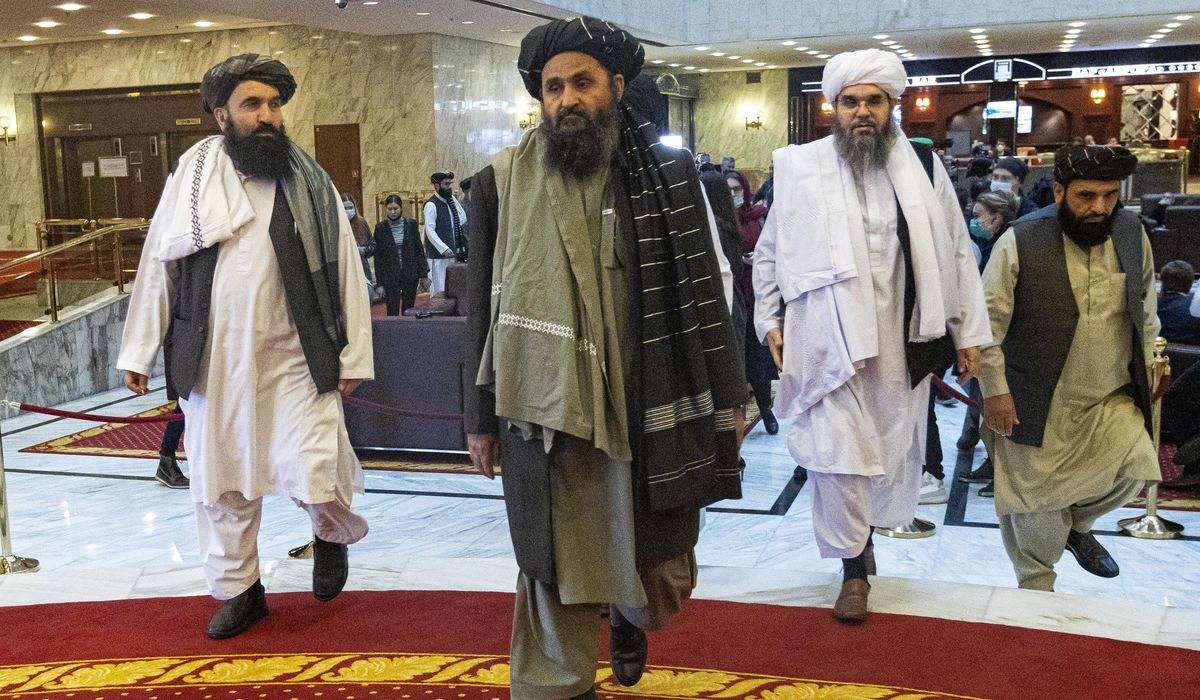Taliban leadership maintains fundamentalist lineage as group regains power

Mullah Abdul Ghani Baradar, the Taliban’s most public figure and viewed by many as Afghanistan’s next leader, has reemerged triumphantly in his home country.
Just days before he returned Tuesday, the U.S.-backed, democratically elected Afghan President Ashraf Ghani absconded when his last remaining stronghold fell to the Taliban.
A video posted by the Taliban on Twitter showed Mullah Baradar being greeted with cheers as he exited a Qatari C-17 at the Kandahar airport.
His return marked the conclusion of more than 10 years of exile from his home country and signaled a return of the Taliban’s reign in Afghanistan.
The Taliban originated in the early 1990s, formed by mujahedeen forces who resisted Soviet occupation in Afghanistan from 1979 to 1989, and religious fundamentalists from Pakistani madrassas.
The group promised to restore order from the unrest after the Soviet occupation. It seized Kabul in 1996 and maintained a tight grip on the country until the U.S. invasion in 2001.
Since 2001, the group has remained largely in the shadows, shunned by the international community, prompting Taliban efforts at an image makeover. Namely, they created an appearance of distancing themselves from terrorist organizations such as al Qaeda.
But as the Taliban reemerges almost 20 years later, its key leaders maintain roots from the group’s fundamentalist beginnings. Among the insurgency’s key figures are:
Hibatullah Akhundzada
Born in 1961, Mr. Akhundzada came of age as part of the resistance to the Soviet occupation. He joined the Taliban movement in the mid-1990s as the group tightened its grip on the destabilized, post-Soviet Afghanistan.
Largely thought of as a religious leader, Mr. Akhundzada eventually became an official in the Taliban’s courts, handing down draconian punishments guided by the group’s interpretation of Shariah law.
After the Taliban’s government was toppled by the U.S. invasion in 2001, Mr. Akhundzada is believed to have remained in Afghanistan and maintained close ties to Taliban leadership. In 2015, he became a deputy to the Taliban’s second supreme commander, Mullah Akhtar Mansour.
In 2016, Mansour was killed in a U.S. drone strike in Pakistan. Mr. Akhundzada was named as his successor.
Mullah Abdul Ghani Baradar
Officially, Mullah Baradar is known as the vice emir of the Islamic Emirate of Afghanistan, second only Mr. Akhundzada.
Born in 1968, Mullah Baradar also cut his teeth in battle against the Soviet forces in the 1980s. After the Soviet withdrawal, Mullah Baradar co-founded the Taliban along with the group’s first supreme commander, Mullah Mohammad Omar. Mullah Baradar fought in the insurgency that led to the Taliban’s rule.
He fought U.S.-backed forces in Afghanistan after the U.S. invasion and reportedly entered failed peace negotiations with Afghan President Hamid Karzai. In 2010, he was arrested in Pakistan, where he remained imprisoned until 2018.
He was appointed as Mr. Akhundzada’s political deputy and, upon his release from prison, led Taliban peace talks with the U.S. from the Taliban’s Doha office under the Trump administration.
Mullah Muhammad Yaqoob
Born in the early 1990s, Mullah Muhammad Yaqoob is the eldest son of the Taliban’s first supreme commander, Mullah Omar. He was lauded by many within the Taliban as the potential successor to the group’s second supreme commander, Mullah Akhtar Mansour, but is believed by others to be too young to assume the role.
He was appointed as Mr. Akhundzada’s deputy in charge of military operations for close to half of the Taliban’s forces.
Mullah Yaqoob was recently recorded telling Taliban insurgents to protect places of business and to leave marketplaces open during the latest sweeping push to overtake provincial capitals after the U.S. withdrawal. The Associated Press reported the recording.
Sirajuddin Haqqani
Sirajuddin Haqqani leads the Haqqani Network, a militant offshoot of the Taliban, and serves as co-deputy for military operations along with Mullah Yaqoob. The group has orchestrated several high-profile attacks in Afghanistan throughout the U.S. occupation.
Mr. Haqqani is wanted by the FBI for questioning in connection with a 2008 attack on a hotel in Kabul that killed an American citizen along with five others. He is also believed to have carried out an assassination attempt on Mr. Karzai.
In 2020, Mr. Haqqani penned an op-ed in The New York Times titled “What We, the Taliban, Want,†urging an end to the war spanning two decades.
“I am confident that, liberated from foreign domination and interference, we together will find a way to build an Islamic system in which all Afghans have equal rights, where the rights of women that are granted by Islam â€" from the right to education to the right to work â€" are protected, and where merit is the basis for equal opportunity,†he wrote.
Sign up for Daily Newsletters
0 Response to "Taliban leadership maintains fundamentalist lineage as group regains power"
Post a Comment